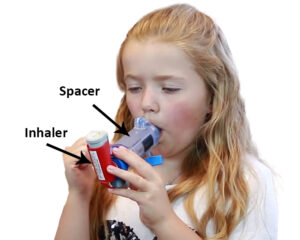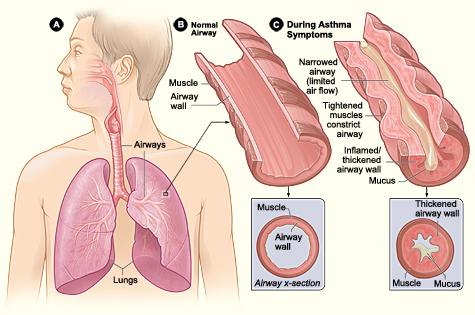
Did you know that asthma is the most common chronic condition among children? It’s also the third leading cause of hospitalization in children less than 15 years of age. While there is no cure for asthma, it is manageable and treatable and shouldn’t limit a child’s participation in school or sports.
What is asthma?
Asthma is a condition of the lungs in which the airways, or bronchial tubes, are more sensitive or ‘twitchy’. Under certain conditions, or in response to ‘triggers’, the airways can swell, the muscles surrounding the bronchial tubes can tighten, and the bronchial tubes can secrete extra mucus. All these changes can lead to coughing, wheezing, or trouble breathing.
What causes asthma?
The cause of asthma is unknown, but we do know that both genetics and the environment can influence whether or not someone will be diagnosed with asthma.
Risk factors for asthma include:
- Having a parent with asthma (especially a mother)
- Being exposed to tobacco during pregnancy or early childhood
- Having other medical conditions such as allergies or obesity
Your health care provider should be able to help make the diagnosis of asthma. Depending on the severity of your child’s symptoms, your provider might also refer you to a specialist who can do further testing, such as spirometry (also called a pulmonary function test) or testing for allergies.
Managing asthma symptoms
Fortunately, there are two major things that can be done to reduce asthma problems:
1. Identify your asthma triggers
Asthma triggers are different for different people, but common triggers in children include colds, weather changes, vigorous exercise, and tobacco smoke exposure. Exposure to allergens such as pet dander can also be a problem for some children. Poor air quality (such as from wildfire haze) and household items such as hairspray, strong colognes, or perfumes can also be asthma triggers. You can usually identify your child’s asthma triggers by paying attention and doing some detective work, but allergy testing can also sometimes be helpful.
2. Asthma medications
Most children with asthma will only require medication to treat symptoms as needed. Bronchodilators are a type of medication used to treat symptoms by helping to open the airways for easier breathing. They are typically taken as a metered dose inhaler (MDI) with a spacer or holding chamber to better distribute medication to the lungs.

Albuterol is the most commonly prescribed bronchodilator. It is also known by the brand names: ProAir, Ventolin, or Proventil. Albuterol can be used as needed for symptoms of coughing or wheezing. It can also be used prior to vigorous activity to prevent asthma symptoms associated with exercise.
Some children have more frequent asthma symptoms and may require use of an asthma ‘controller’ medication, such as a daily low dose inhaled steroid. These medications can often be very effective in controlling asthma symptoms.
Using asthma medications properly is essential in managing asthma. The following video demonstrates how to use an inhaler correctly. Your medical team at Pediatrics Northwest can also assist in providing instruction on how to use inhalers and other asthma medications.
COVID-19 & asthma
Many parents of children with asthma have worried about the impact of COVID-19 on their child’s health. The good news is that the data thus far indicate that children with asthma are not at a higher risk of being sick or hospitalized when infected with the coronavirus. All asthma specialists agree, however, that all persons 12 and older, including those with asthma, should be fully vaccinated with one of the coronavirus vaccines.
When to seek help
If you or your child has asthma, it’s important to work with your healthcare provider in making sure that your asthma is controlled. Having asthma under control means that sleep shouldn’t be affected by waking up coughing or wheezing, your child shouldn’t be missing school, and your child should be able to participate fully in gym class and sports. Of course, avoidance of any exposure to tobacco smoke is essential in management of good health for all.
If you have concerns about your child’s breathing, or whether he or she might have asthma, don’t hesitate to discuss these concerns with your child’s health care provider. At Pediatrics Northwest, our providers and specialists are committed to providing exceptional asthma care. Our practice has recently chosen asthma management as a field in which to focus quality improvement project efforts. We are here for you to answer any questions and help develop a plan for managing you or your child’s asthma symptoms.
Resources
Related Stories




